Highest-Ever Mauna Loa* CO2 Levels in recorded human history
(and millions of years before that) – CO2 Records
| NOAA MLO | Scripps MLO | |
| Daily CO2 | 430.60 ppm Mar 7 2025 | 428.63 ppm Apr 26 2024 |
Across Canada – here
Around The World
Meanwhile, atmospheric CO2 keeps accelerating upwards
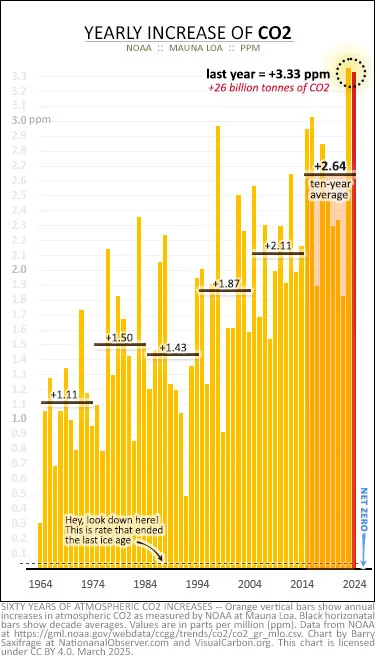
March 14th 2025 – Barry Saxifrage – National Observer
The primary driver of our planetary climate crisis — carbon dioxide gas (CO2) — continues to pile up in our atmosphere at an accelerating rate. And the last two years were record-busting huge. Take a look.
This chart shows the latest data from the United States National Oceanic and Atmospheric Agency (NOAA).
Orange bars indicate the CO2 increase for each of the last 60 years.
For example, that small bar on the far left is 1964. That year CO2 increased by 0.31 parts per million (ppm).
The tall red bar on the far right is 2024. It shows that last year CO2 rose by 3.33 ppm. The only other year close to this extreme was 2023.
In sheer weight, each of the last two years added another 26 billion tonnes of CO2 to the atmosphere. That’s more than three tonnes each year per human. For high emitters like Canadians, it’s closer to ten tonnes per year.
While those are huge numbers, many of you know that humans emit twice that much CO2 each year. Around half of what we emit gets taken out of the atmosphere by the oceans (causing ocean acidification) and by plants. Without these “CO2 sinks” the atmosphere would gain CO2 twice as fast.
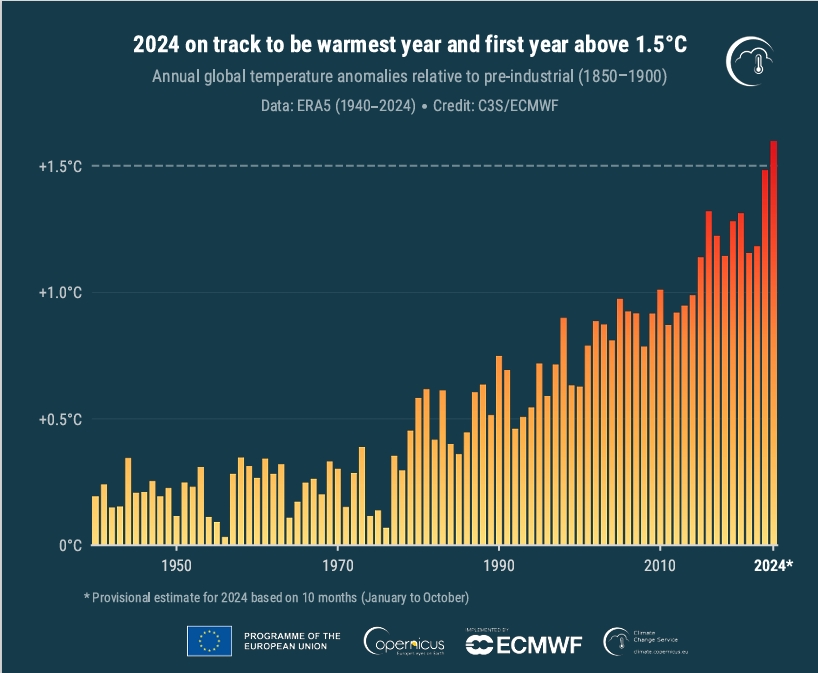
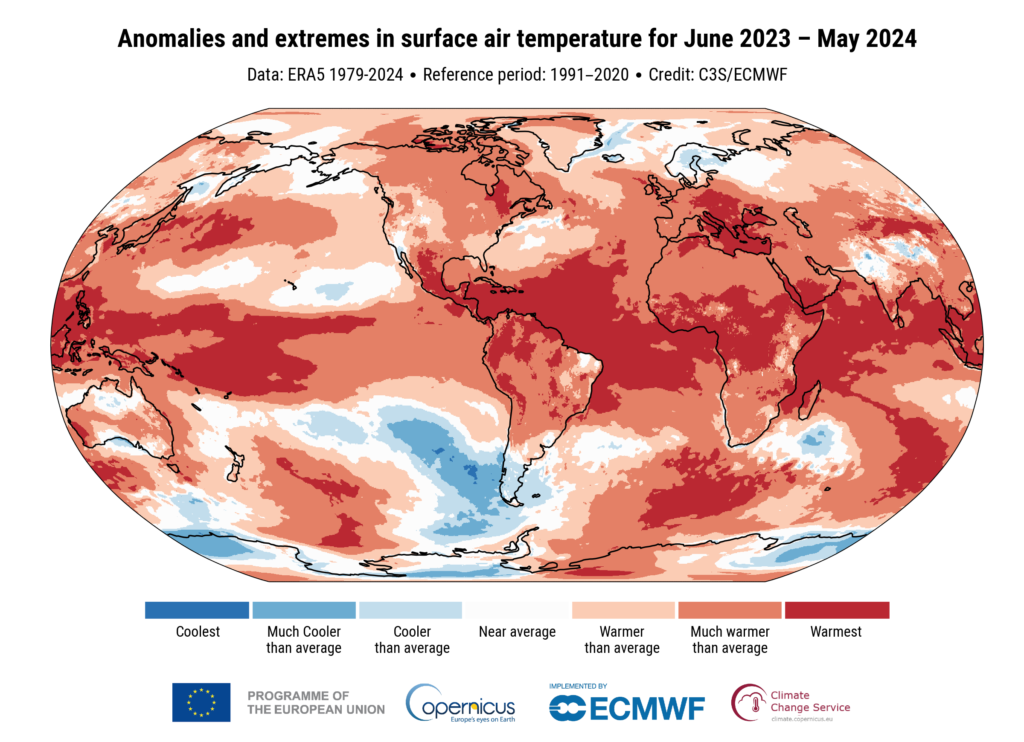
May 2024 marks 12 months of record-breaking global temperatures
6th June 2024 – Copernicus
May 2024 was warmer globally than any previous May in the ERA5 reanalysis dataset, going back to 1940, and was the twelfth month in a row that was the warmest in the ERA5 record for the respective month of the year.

CO2 jumped by record amount last year
March 27, 2024 – Barry Saxifrage – National Observer
“The accumulation of CO2 in the atmosphere is irreversible on human timescales and will affect climate for millennia.” — World Meteorological Organization (WMO)
Despite decades of global efforts to prevent a full-blown climate crisis, the primary driver of it — CO2 — continues to pile up in our atmosphere at an accelerating rate. And last year’s CO2 rise was record-busting extreme.
…In sheer weight, last year’s surge added a record 26 billion tonnes of CO2 to the atmosphere — more than three tonnes per human. – More
‘Alarming’ Global Warming Smashes Records for 9th Straight Month
March 7, 2024 – the Energy mix | Full Story: The Associated Press | Primary Author: Seth Borenstein

For the ninth straight month, Earth has obliterated global heat records—with February, the winter as a whole, and the world’s oceans setting new high-temperature marks, according to the European Union climate agency Copernicus.
The latest record-breaking in this climate change-fueled global hot streak includes sea surface temperatures that weren’t just the hottest for February, but eclipsed any month on record, soaring past August 2023’s mark and still rising at the end of the month. More
Climate change drives world to first 12-month spell over 1.5C
February 8, 2024 – Reuters
Kate Abnett and Gloria Dickie
The world just experienced its warmest January on record, marking the first 12-month period in which temperatures averaged more than 1.5C (2.7F) above pre-industrial times, the European Union’s climate change monitoring service said on Thursday.
2023 Made Life ‘Miserable, Sometimes Deadly’ as Warmest Year on Record

January 10, 2024 – the Energy Mix
Earth last year shattered global annual heat records, flirted with the world’s agreed-upon warming threshold, and showed more signs of a feverish planet, the European climate agency said Tuesday.
The European climate agency Copernicus said the year was 1.48°C (2.66°F) above pre-industrial times, The Associated Press reports. That’s barely below the 1.5° limit the world hoped to stay within in the 2015 Paris climate accord to avoid the most severe effects of warming.
It is now official: November 2023 was the warmest November on record
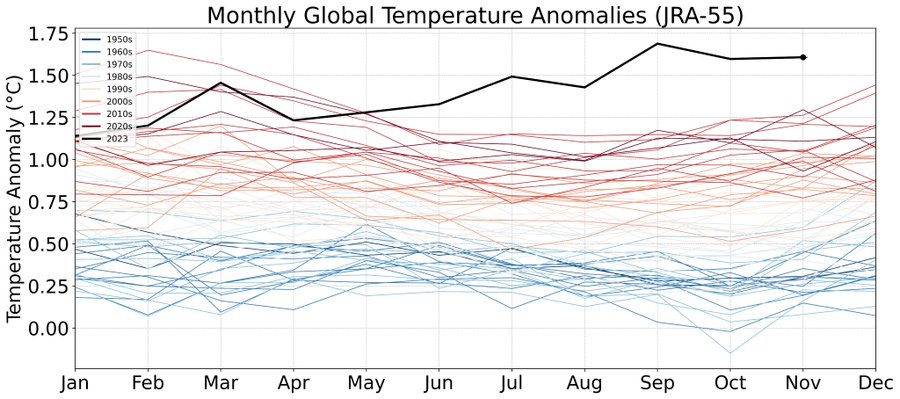
November 2023 indeed broke records as the hottest November ever recorded. The global mean temperature for this month soared to 1.43 degrees Celsius above pre-industrial levels, surpassing all previous Novembers1. This warming trend is part of a larger pattern: 2023 is on track to become the hottest year on record1
The numbers are coming in for October and they’re not good.
< Here’s how October 2023 compares to the last 80 Octobers.
Not quite as “gobsmackingly bananas” as September but this year’s radical temperatures are continuing. September was about 1.8 C above pre-industrial temperatures, October was about 1.7 C.
< Here’s an update on the radical departure of 2023 from previous years
It’s “virtually guaranteed” to be the hottest year on record, and for at least 125,000 years.
“The amount that we’re smashing records by is shocking,” said Samantha Burgess, deputy director of the Copernicus Climate Change Service.
Hottest September ever
Oct 14, 2023 – Environment and Climate Change Canada
According to the Copernicus Climate Change Service, September 2023 emerged as the hottest September ever documented worldwide, shattering previous records by a significant margin.
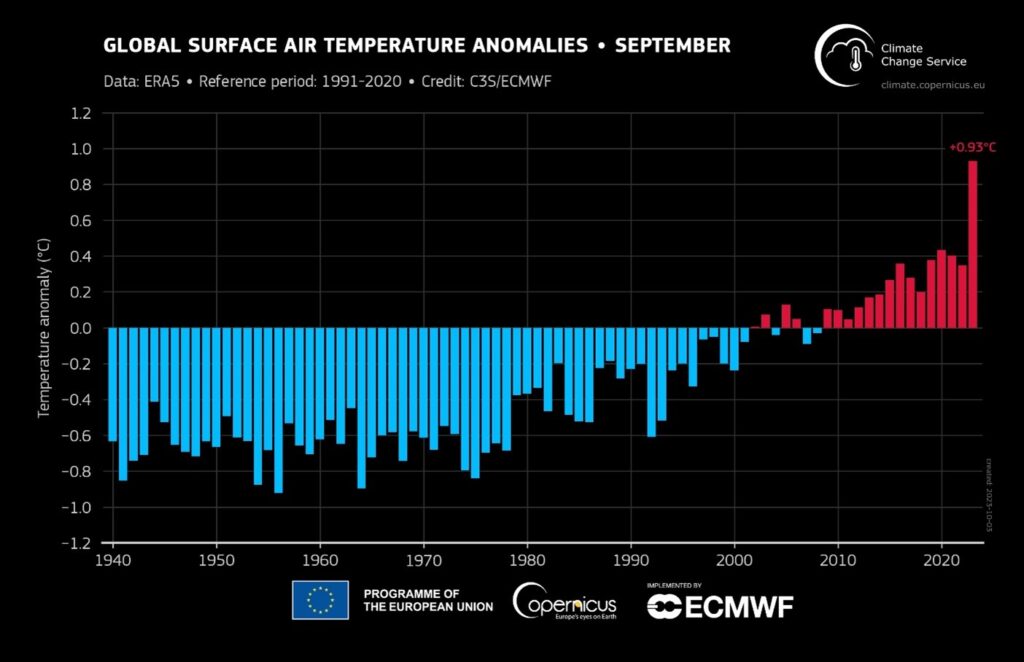
September’s average temperature was 16.38°C, surpassing the previous record set in 2020 by 0.5°C. It was also 1.75°C warmer for the month of September compared to the pre-industrial reference period (1850-1900).
Graph showing how much warmer or cooler the air temperature has been around the world over the years compared to what’s considered normal for the month of September from 1940 to 2023. Credit: the Copernicus Climate Change Service.
Since June 2023, the world has experienced an extraordinary surge in heat on land and in the oceans. This is unlike anything we’ve seen before. Other climate variables provide additional evidence of this extraordinary heat, with this year’s Antarctic maximum sea ice extent reaching an all-time low.

Antarctic sea ice reached its lowest maximum extent on record on September 10 at a time when the ice cover should have been growing at a much faster pace during the darkest and coldest months. Source: NASA Earth Observatory.
The recent record-breaking warming of land and ocean temperatures highlights how natural climate fluctuations can add to and amplify the ongoing warming due to emissions of greenhouse gases from human activity. Over recent months, numerous longstanding high-temperature records have crumbled, putting 2023 on track to become the hottest year on record worldwide.
Hottest July on record
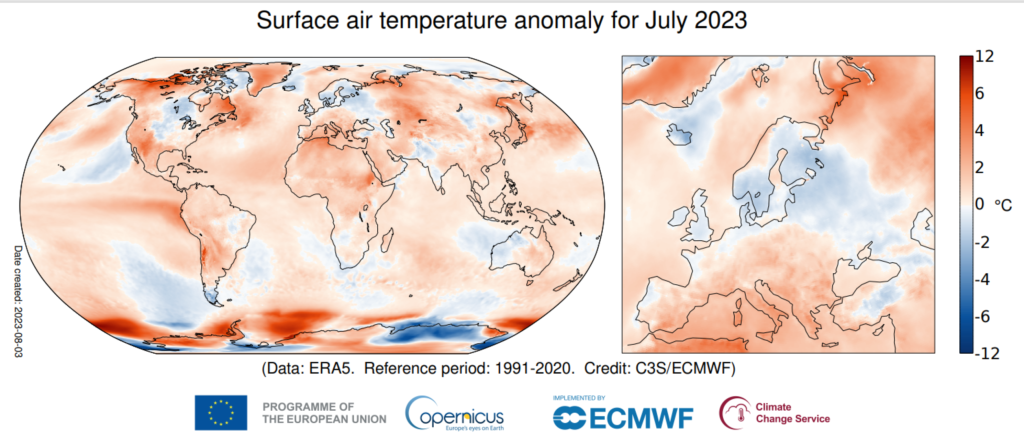
The global average temperature for July 2023 is confirmed to be the highest on record for any month. The month was 0.7°C warmer than the 1991-2020 average for July, and 0.3°C warmer than the previous warmest month, July 2019. The month is estimated to have been around 1.5°C warmer than the average for 1850-1900.
Heatwaves were experienced in multiple regions of the Northern Hemisphere, including southern Europe. Well-above average temperatures occurred over several South American countries and around much of Antarctica. El Niño conditions continued to develop over the equatorial eastern Pacific. Marine air temperatures were well above average in several other regions.
Surface air temperature for July 2023 | Copernicus
Ocean heat record broken, with grim implications for the planet
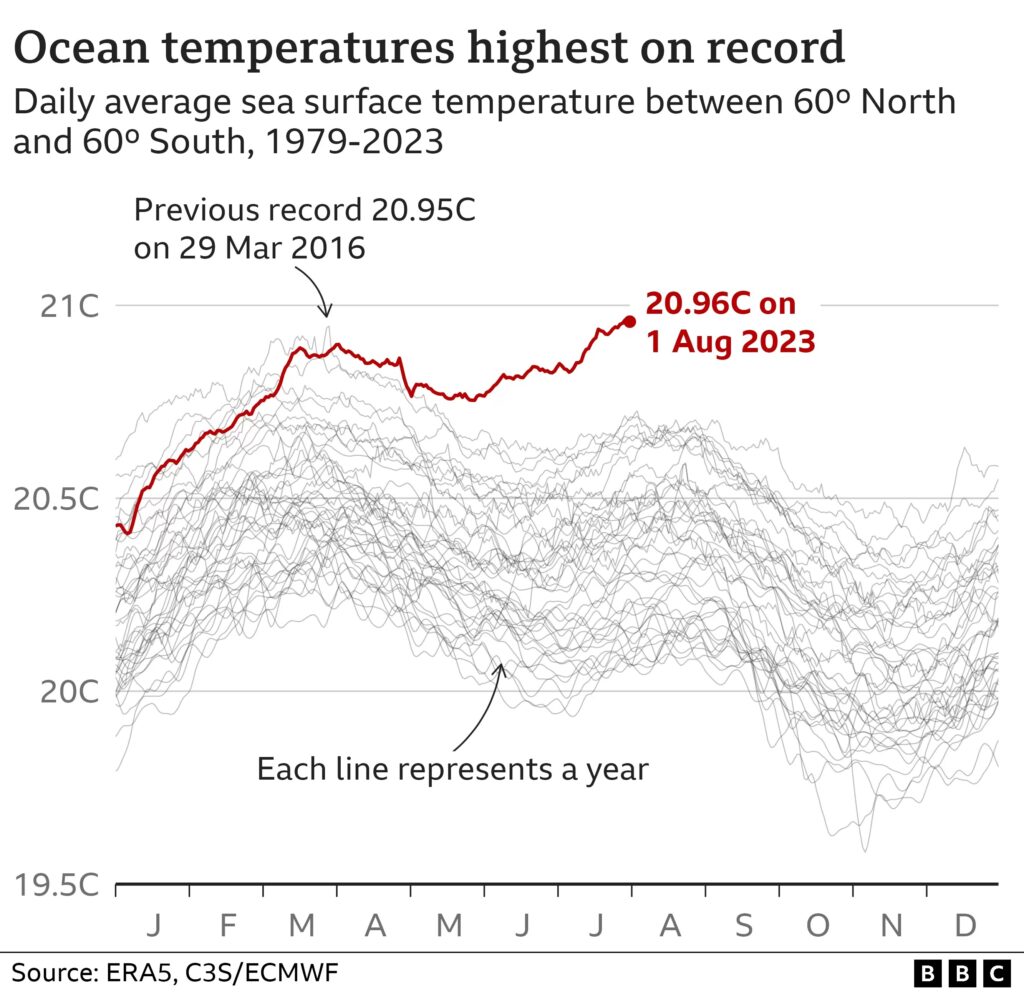
Aug 4, 2023 – BBC
The oceans have hit their hottest ever recorded temperature as they soak up warmth from climate change, with dire implications for our planet’s health.
The average daily global sea surface temperature beat a 2016 record this week, according to the EU’s climate change service Copernicus.
It reached 20.96C (69.73F) – far above the average for this time of year.
‘Uncharted territory’: UN declares first week of July world’s hottest ever recorded

July 11, 2023 – the Guardian
“The world just had the hottest week on record, according to preliminary data,” the WMO said in a statement, adding that temperatures were breaking records on land and in the oceans, with “potentially devastating impacts on ecosystems and the environment”.
“We are in uncharted territory and we can expect more records to fall as El Niño develops further and these impacts will extend into 2024,” said Christopher Hewitt, WMO director of climate services.
“This is worrying news for the planet.”
For the third time this week, Earth sets an unofficial heat record.
Monday, July 3: 17.01 Celsius (62.6 degrees Fahrenheit), Earth’s highest ever average global temperature.
Tuesday, July 4: 17.18 Celsius, breaking the previous record set Monday!
Wednesday, July 5: 17.18 Celsius, remaining at the record high set the day before.
Update – Thursday, July 6: Global temperatures reached a new high of 17.23 Celsius, noted AP.
UK weather: hottest June since records began – Met Office

July 3, 2023 – Georgina Rannard – BBC
The average monthly temperature of 15.8C (60.4F) exceeded the previous highest average June temperature, recorded in 1940 and 1976, by 0.9C.
Climate change made the chance of surpassing the previous joint record at least twice as likely, scientists also said.
Records were broken in 72 of the 97 areas in the UK from which temperature data is collected.
Spain breaks record temperature for April – BBC News

April 28, 2023 – BBC News
Spain recorded its hottest ever temperature for April on Thursday, hitting 38.8C according to the country’s meteorological service.
The record figure was reached in Cordoba airport in southern Spain just after 15:00 local time (14:00 BST). For days a blistering heatwave has hit the country with temperatures 10-15C warmer than expected for April. It’s been driven by a mass of very hot air from Africa, coupled with a slow moving weather system.
Records Set Across Canada
Great Lakes ice coverage reaches historic low
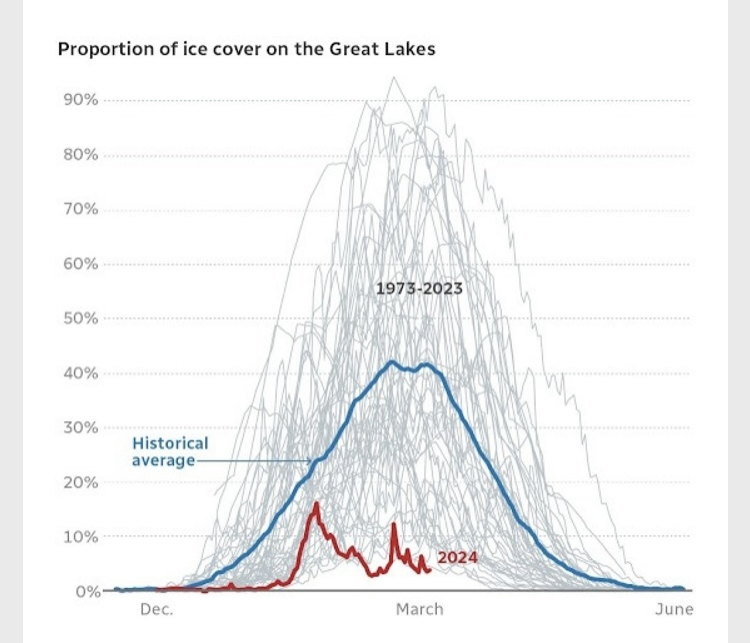
NOAA researchers at NOAA’s Great Lakes Environmental Research Laboratory (GLERL) report that they’ve seen a steady decrease in ice coverage across the Great Lakes, which has reached a historic low.
“We’ve crossed a threshold in which we are at a historic low for ice cover for the Great Lakes as a whole,” says GLERL’s Bryan Mroczka, a physical scientist. “We have never seen ice levels this low in Mid-February on the lakes since our records began in 1973.” NOAA Research Read article
Canada’s “hellish” wildfire season defies the calendar

Sept 29, 2023 – Andrew Freedman – Axios
Canada’s wildfire season, already the worst on record, went “completely off the rails” during the past week, scientists tell Axios.
The big picture: Enough land area burned in the past week to make the seven-day-period comparable to nearly an entire typical fire season across Canada, according to Merritt Turetsky of the University of Colorado.
- While five provinces and territories, stretching from Nova Scotia to the Northwest Territories, saw record amounts of land burned this season, western Canada has been hit the hardest, she said in an interview.
- “Things have just continued to play out in kind of a hellish way in western Canada,” she said.
- During the past few days, smoke from wildfires in British Columbia and the Northwest Territories has tinted the skies over Greenland and northern Europe.
These fires are burning at a time of year when Canada’s fire activity tends to be on a sharp decline.
Canadian wildfire emissions hit record high as smoke reaches Europe
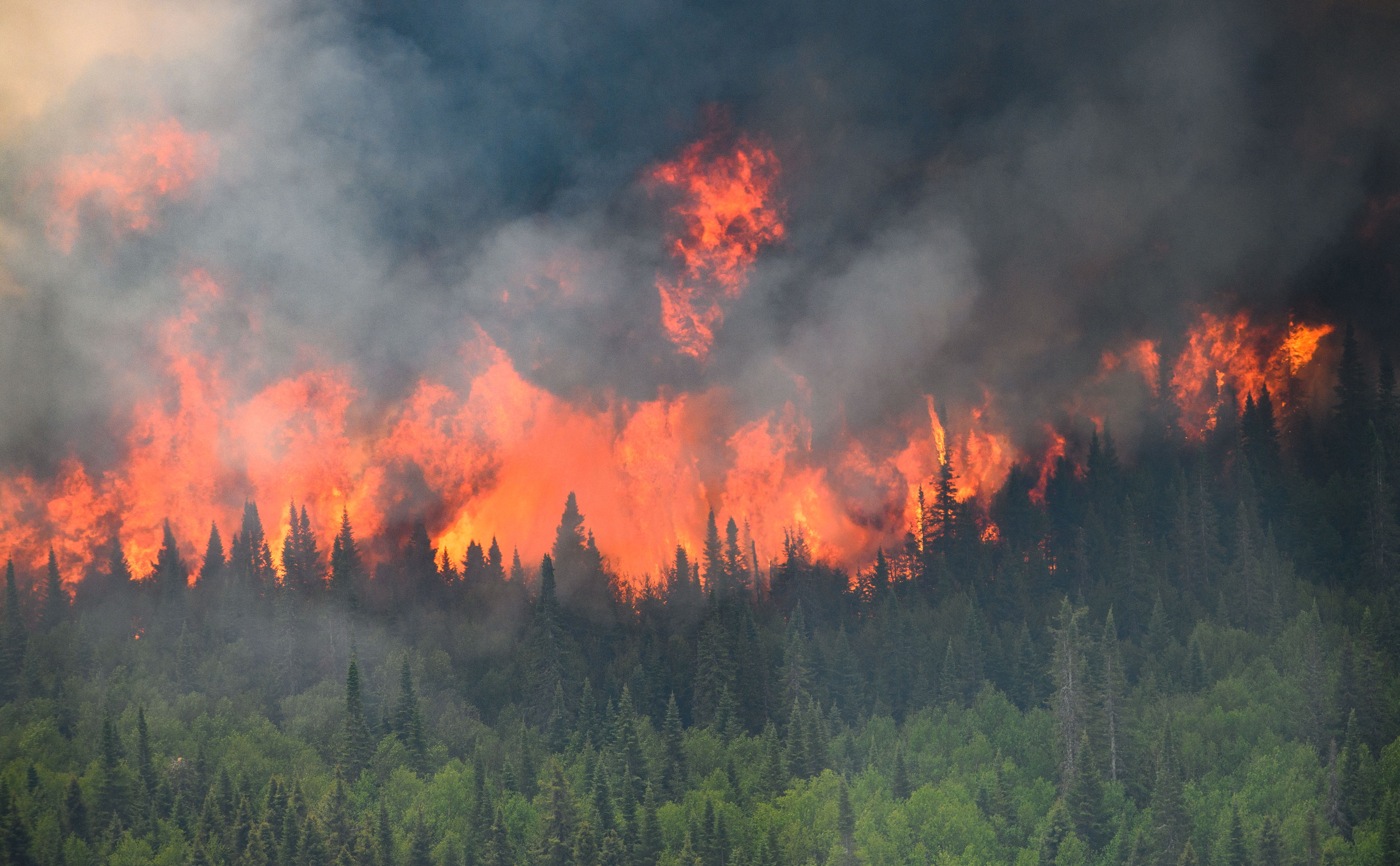
June 27, 2023 – Gloria Dickie – Reuters
Wildfires burning through large swathes of eastern and western Canada have released a record 160 million tonnes of carbon, the EU’s Copernicus Atmospheric Monitoring Service said on Tuesday.
This year’s wildfire season is the worst on record in Canada, with some 76,000 square kilometres (29,000 square miles) burning across eastern and western Canada. – more
Donnie Creek wildfire is now the largest in B.C.’s history

June 19th 2023 – By Brieanna Charlebois – National Observer
The Donnie Creek wildfire has grown into the largest blaze ever recorded in British Columbia, BC Wildfire Service said Sunday.
The fire, which is burning south of Fort Nelson in northeastern B.C., is now estimated at more than 5,343 square kilometres in size.
It surpasses the Plateau fire that charred 5,210 square kilometres northwest of Williams Lake in 2017 and was previously considered the province’s largest fire. – more
